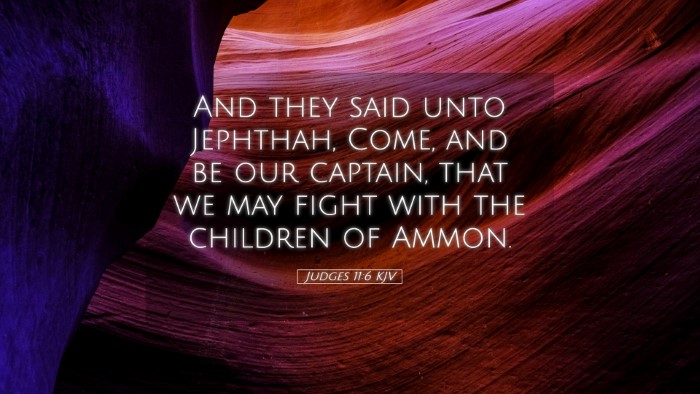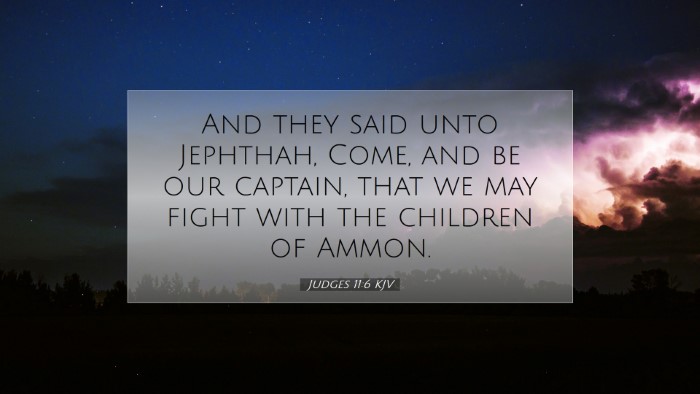Commentary on Judges 11:6
This passage recounts a pivotal moment in the history of Israel during the period of the Judges. The verse states:
“And they said unto Jephthah, Come, and be our captain, that we may fight with the children of Ammon.”
Contextual Understanding
The context of Judges 11 is crucial for appreciating the significance of this verse. Israel was facing oppression from the Ammonites, and in their time of need, they turned to Jephthah, a man with a controversial background.
Overview of Jephthah
Jephthah is identified as a mighty warrior but is also noted for his illegitimacy, being the son of a harlot. This duality in his identity provides deep insights into the themes of redemption and divine selection throughout Scripture.
Insights from Commentaries
- Matthew Henry: Henry emphasizes the grace of God in calling individuals like Jephthah for significant roles despite their past. He notes how God often chooses the unlikely candidates to accomplish His purposes.
- Albert Barnes: Barnes comments on the sociopolitical landscape that prompted the Israelites to seek a leader. He notes that their distress led them to recognize Jephthah's capabilities, suggesting that necessity often leads to clarity in leadership choices.
- Adam Clarke: Clarke elaborates on the nature of Jephthah's leadership and his dynamic as a leader born out of rejection. He provides insight into Jephthah's resilience and the people's appeal to him, highlighting a common theme within Judges where leaders rise from dire circumstances.
Theological Implications
This verse raises significant theological implications regarding leadership, divine calling, and human frailty. Jephthah's story illustrates how God can use individuals with flawed histories to achieve His purposes, challenging preconceived notions about qualifications in leadership.
Leadership in Crisis
Jephthah was called in a moment of crisis, underscoring that effective leadership is often born from urgent needs. The cry of the people reflects a recognition of their vulnerability and their willingness to turn to a leader who had previously been marginalized.
The choice of Jephthah as their captain encapsulates a theme of redemption where God redeems those whom society might reject.
Rejection and Acceptance
Jephthah's acceptance as captain after having been cast out serves as a profound reminder of the redemptive work of God. His life story illustrates the transition from rejection to acceptance, mirroring the experiences of many biblical figures who faced similar trajectories, including David and Paul.
Faith and Vows
As the narrative unfolds, Jephthah's subsequent vow to God highlights the complexities of faith and the often precarious promises made in dire situations. This aspect calls for deep reflection on the nature of vows and the responsibilities that accompany leadership.
Practical Applications
The lessons derived from Judges 11:6 can be applied in contemporary contexts in the following ways:
- Choosing Leaders Wisely: The importance of discerning character and capability over past failures in selecting leaders is critical.
- Responding to Crisis: This narrative informs how communities can respond to crises by seeking out strong leaders, even those who may not fit traditional molds.
- Divine Redemption: Believers should be encouraged by the reality that God can use anyone for His purposes, emphasizing His grace and sovereignty.
- Careful with Vows: The commitments made in moments of desperation must be handled with care, considering their implications.
Conclusion
Judges 11:6 is not merely a narrative of military leadership; it encapsulates profound themes of redemption, grace, and the complexities of human decision-making in desperate times. The insights drawn from public domain commentaries open a robust dialogue on the nature of leadership and the unpredictability of God's plans. For pastors, students, theologians, and scholars, these themes represent a catalyst for deeper exploration into the human condition and the divine purposes woven through Scripture.


